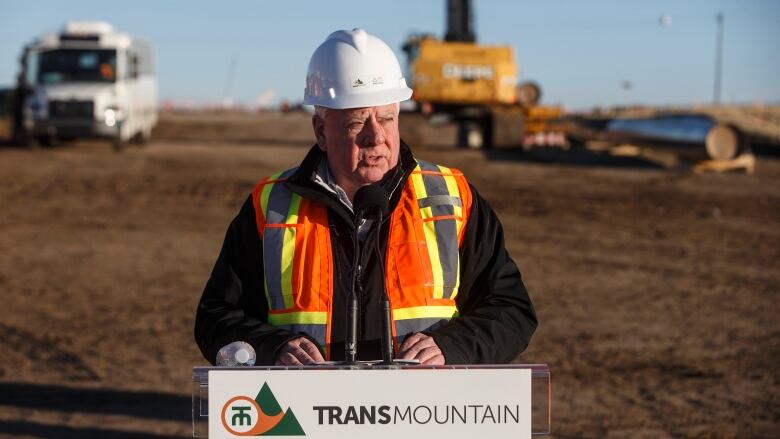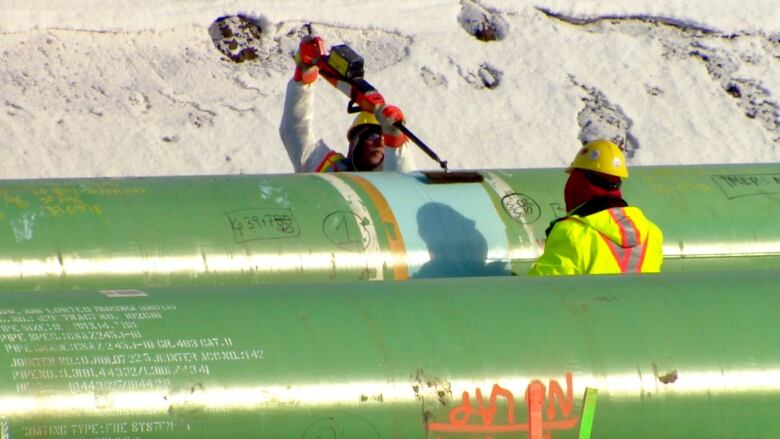The Trans Mountain project faces a year of challenges and opportunity
Safety concerns, Keystone XL uncertainties and unresolved Indigenous ownership questions linger over pipeline

After a hiatus ofabouttwoweeks, construction on the Trans Mountain pipeline expansion is expected to resume today, but with a restricted workforce.
The return to work marks the beginning of a critical year for the federalgovernment-owned pipeline. In 2021, the project plans to make significant progress on workto twin the existing 1,500 kilometre Alberta-to-British Columbia pipeline. Hiring and projectspending are expectedto increase asadditional sections of the pipeline are built.
But 2021could bring with it more headaches and setbacks for the pipeline's Crown corporation and the project's owners Canadian taxpayers.
Safety lapses tell a story
Trans Mountain ended 2020 on a relativehigh note. Construction acceleratedastheworksiteCOVID-19 caseload remainedrelatively low, andthe existing pipeline also remained full. Trans Mountain's CEO Ian Anderson said that, coming off a bleakyear for the industry whena bottle of olive oilwas worth more than a barrel of Canadianoil the project's performancewas asurprise.
"I fully expected to lose some volumebut we didn't," Anderson told CBC News in a year-end interview.
Anderson spoke to CBC before Trans Mountain Corporation took the surprising step last month of haltingproject constructiontemporarily. (Trans Mountain declined CBC's requests for follow-up interviews.)
But the sudden shutdown was likely the last resort, said a former top energy industry executive in Calgary.
"Major construction projects never want to stop once they get going," said Dennis McConaghy, a former executive vice president at TransCanada, now called TC Energy.
British Columbia'sPublic Health Officer has ordered five major industrial projects in northern B.C., including the Trans Mountain pipeline expansion, to reduce the size of theirworkforces in an attempt to ensure the northern health region does not become overwhelmed with COVID-19 cases.
The abrupt move to halt constructionon Dec. 18happened after a worker was seriously injured at a worksite at Trans Mountain's Burnaby Terminal in British Columbia. Few details have been releasedbut, in announcing the shutdown,Anderson referred to safety incidents he called "unacceptable" and "inconsistent" with his corporation's safety record.
In October, a contract worker on the project, Samatar Sahal, wasstruck and killed by a piece of equipment.
Trans Mountain hasn't said whether these latest incidents are one-offs or point to systemic problems withthe project. But the pipeline corporation said it has spent the last several days reviewing updated safety plans contractors have developed.
"This safety stand-down provided time for Trans Mountain, its contractorsand its employees to re-focus on safety," saida statement issued by the corporationon Thursday. "We are confident construction will commence on a staggered basis over the coming week."
A frequent critic of the expansion said that, while worker safety should always be theparamount concern,the pause and the recentdecision to part ways with somecontractors are early signs of problems.
"Obviously, no one wants to see any risks to the workers in terms of occupational health and safety. Those to me suggest rushing through and trying to meet these deadlines," said Eugene Kung, a staff lawyer at West Coast Environmental Law. "And to me, what that means ultimately is likely higher project construction costs and a delayed in-service date."
What killing Keystone XL means for TMX
This month, U.S. President-Elect Joe Biden assumes office after campaigning to kill the Keystone XL pipeline a pipelineconstruction project that wouldstretchfrom Hardisty, Alta. to Steele City, Nebraska.
The Alberta government has pinned its hopes on the completion of that project. The province said it wouldinvest$1.5billion in Keystoneas equity in 2020, backed further by another $6billion project level credit facility in 2021.
While the trouble facingKeystone XL might be a setback for Canada's oilpatch and the Alberta government,it could offer a further compelling argument for Trans Mountain's backers, who are always defending the pipeline against fierce criticism.
"It is highly likely that Joe Biden will find some way to disable construction of the Keystone XL in the United States," said McConaghy, who oversaw the Keystone XL project for Trans Canada."I say that with a great deal of sadness, disappointment and anger."
"So as far as 2021 is concerned, I think the efforts to get TMX built get even more critical than they were before."
The fate of Keystone XL will have little impact on Trans Mountainbecause Trans Mountain already has guaranteed long-term contracts with shippers for 80 per cent of its capacity,Anderson told CBC News.
"I don't think there is a material direct effect of Keystone XL or Line 3 on Trans Mountain," Anderson said. "I think the markets we're serving are different. And I think the attractiveness of those markets is what our shippers are looking for."
When might Indigenous communities buy into Trans Mountain?
While the federal government isembarking on its third year of ownership of the Trans Mountain pipeline project, its stated plan is to sell it.
Both Trans Mountain and the federal Department ofFinancesay the pipeline hasn't been "de-risked," with only 20 per cent of the $12.6 billion project complete. So no sale is likely in the near term.
In the meantime, the government is engaging with more than 120 Indigenous groups to talk about future ownership or some other form of economic participation.

The head of the National Coalition of Chiefs said he expects First Nations and Mtis leaders will at least decide this yearwhat their economic participation in the Trans Mountain projectwould look like. The coalition has been working with communities interested in sharing the pipeline's economic benefits.
"I think 129 communities are going to decide amongst themselves that they want to move forward with a certain percentage, or a large percentage," said Dale Swampy, president of the coalition. "I think that's important. It'll give the government some headway about how they are going to deal with this."
ADepartment of Financereportconcludedthata form of revenue-sharing or apurchase of anequity stake in the pipeline would be Indigenous communities'"preferred" options for participating in the project.
Both optionscome withadvantages and disadvantages in terms of revenue, and in terms of how much Indigenous communities are willing to bear the risk of a spill, said Swampy.

















_(720p).jpg)


 OFFICIAL HD MUSIC VIDEO.jpg)
.jpg)



























































































